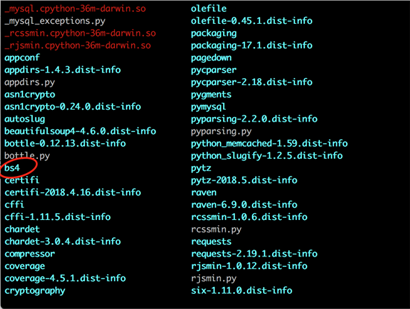Python BS4库的安装与使用详解
Beautiful Soup 库一般被称为bs4库,支持Python3,是我们写爬虫非常好的第三方库。因用起来十分的简便流畅。所以也被人叫做“美味汤”。目前bs4库的最新版本是4.60。下文会介绍该库的最基本的使用,具体详细的细节还是要看:[官方文档](Beautiful Soup Documentation)
bs4库的安装
Python的强大之处就在于他作为一个开源的语言,有着许多的开发者为之开发第三方库,这样我们开发者在想要实现某一个功能的时候,只要专心实现特定的功能,其他细节与基础的部分都可以交给库来做。bs4库 就是我们写爬虫强有力的帮手。
安装的方式非常简单:我们用pip工具在命令行里进行安装
$ pip install beautifulsoup4
接着我们看一下是否成功安装了bs4库
$ pip list
这样我们就成功安装了 bs4 库

bs4库的简单使用
这里我们先简单的讲解一下bs4库的使用,
暂时不去考虑如何从web上抓取网页,
假设我们需要爬取的html是如下这么一段:
下面的一段HTML代码将作为例子被多次用到.这是 爱丽丝梦游仙境的 的一段内容(以后内容中简称为 爱丽丝 的文档):
<html><head><title>The Dormouse's story</title></head> <body> <p class="title"><b>The Dormouse's story</b></p> <p class="story">Once upon a time there were three little sisters; and their names were http://example.com/elsie" class="sister" id="link1">Elsie, http://example.com/lacie" class="sister" id="link2">Lacie and http://example.com/tillie" class="sister" id="link3">Tillie; and they lived at the bottom of a well.</p> <p class="story">...</p> </html>
下面我们开始用bs4库解析这一段html网页代码。
#导入bs4模块 from bs4 import BeautifulSoup #做一个美味汤 soup = BeautifulSoup(html,'html.parser') #输出结果 print(soup.prettify()) ''' OUT: # <html> # <head> # <title> # The Dormouse's story # </title> # </head> # <body> # <p class="title"> # <b> # The Dormouse's story # </b> # </p> # <p class="story"> # Once upon a time there were three little sisters; and their names were # <a class="sister" href="http://example.com/elsie" rel="external nofollow" id="link1"> # Elsie # </a> # , # <a class="sister" href="http://example.com/lacie" rel="external nofollow" id="link2"> # Lacie # </a> # and # <a class="sister" href="http://example.com/tillie" rel="external nofollow" id="link2"> # Tillie # </a> # ; and they lived at the bottom of a well. # </p> # <p class="story"> # ... # </p> # </body> # </html> '''
可以看到bs4库将网页文件变成了一个soup的类型,
事实上,bs4库 是解析、遍历、维护、“标签树“的功能库。
通俗一点说就是: bs4库把html源代码重新进行了格式化,
从而方便我们对其中的节点、标签、属性等进行操作。
下面是几个简单的浏览结构化数据的方式 :
请仔细观察最前面的html文件
# 找到文档的title
soup.title
# <title>The Dormouse's story</title>
#title的name值
soup.title.name
# u'title'
#title中的字符串String
soup.title.string
# u'The Dormouse's story'
#title的父亲节点的name属性
soup.title.parent.name
# u'head'
#文档的第一个找到的段落
soup.p
# <p class="title"><b>The Dormouse's story</b></p>
#找到的p的class属性值
soup.p['class']
# u'title'
#找到a标签
soup.a
# http://example.com/elsie" id="link1">Elsie
#找到所有的a标签
soup.find_all('a')
# [http://example.com/elsie" id="link1">Elsie,
# http://example.com/lacie" id="link2">Lacie,
# http://example.com/tillie" id="link3">Tillie]
#找到id值等于3的a标签
soup.find(id="link3")
# http://example.com/tillie" id="link3">Tillie
通过上面的例子 我们知道bs4库是这样理解一个html源文件的:
首先 把html源文件转换为soup类型
接着 从中通过特定的方式抓取内容
更高级点的用法?
从文档中找到所有<a>标签的链接:
#发现了没有,find_all方法返回的是一个可以迭代的列表
for link in soup.find_all('a'):
print(link.get('href'))
# http://example.com/elsie
# http://example.com/lacie
# http://example.com/tillie
从文档中获取所有文字内容:
#我们可以通过get_text 方法 快速得到源文件中的所有text内容。 print(soup.get_text()) # The Dormouse's story # # The Dormouse's story # # Once upon a time there were three little sisters; and their names were # Elsie, # Lacie and # Tillie; # and they lived at the bottom of a well. # # ...
bs4库的入门使用我们就先进行到这。
以上就是本文的全部内容,希望对大家的学习有所帮助,也希望大家多多支持【听图阁-专注于Python设计】。
